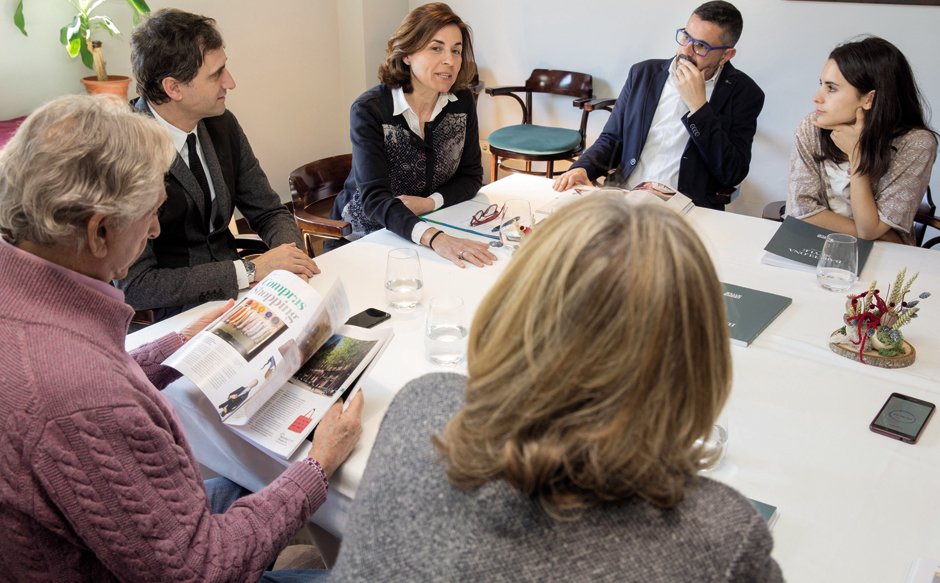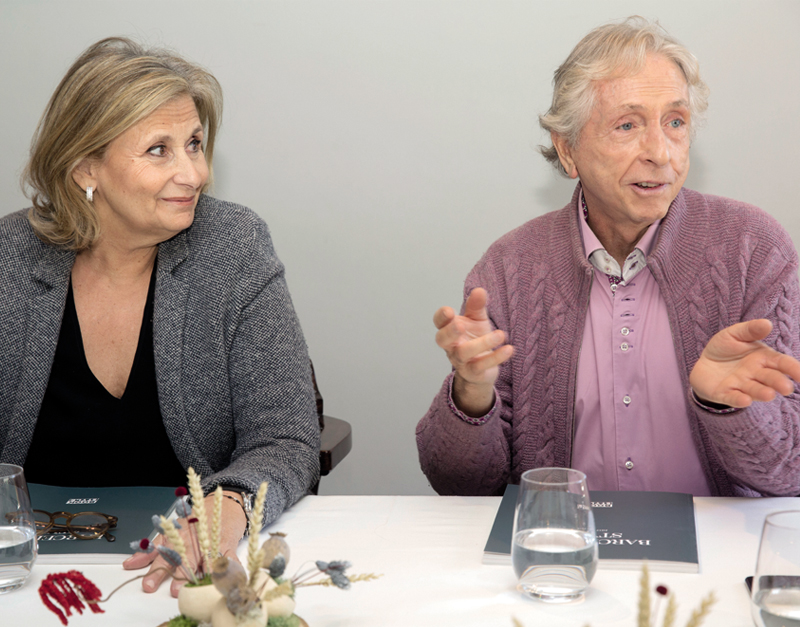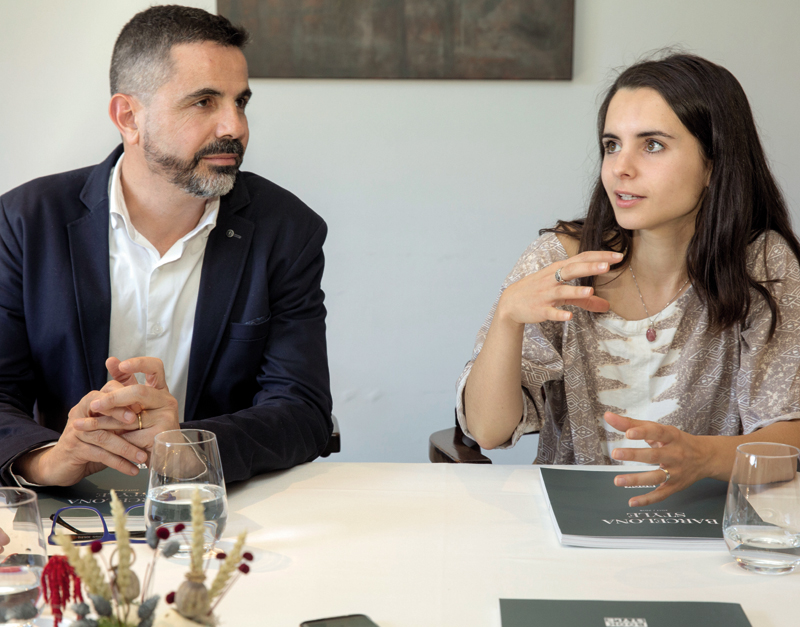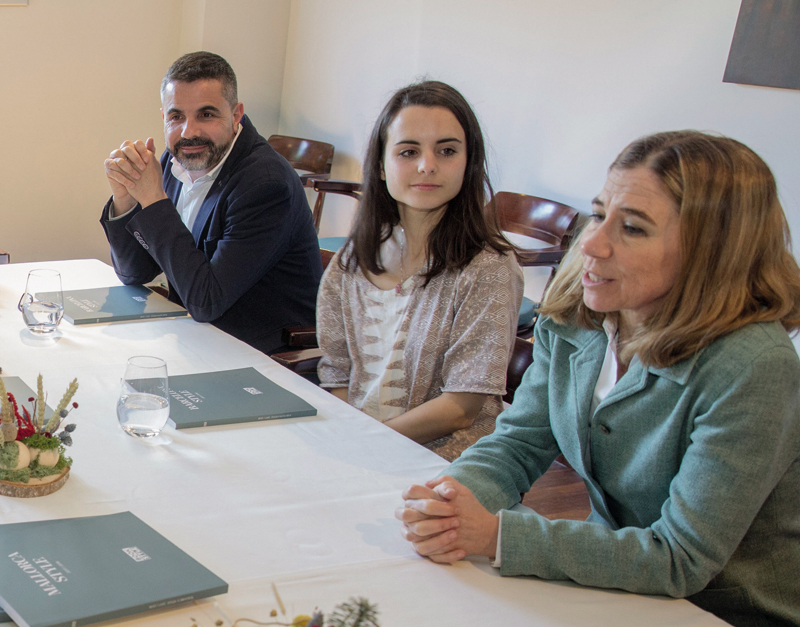We’ve met with five experts in their respective fields (music, engineering, cuisine, hotels and public relations) who are captivated by Barcelona’s beauty and passion.
Fresh sardines, spring onions, wild mushrooms, bread and tomato, still wine, sparkling wine and a mixture of sea and mountains with a touch of Asian spices... that’s the city’s aroma according to the people forming the round table we held at the Barcelona Higher School of Hospitality Services (ESHOB). This school trains the up-and-coming chefs who will soon be staffing the city’s restaurants, giving free rein to their imagination to create dishes that will surprise and delight. “In addition to all these aromas, Barcelona has its own colour, a grey tone that shines when it’s sunny”, says Ada Parellada. And Josep Rubau goes on to add: “Any way you look at it, Barcelona has an almost limitless offering”.
This city’s charm steals away the heart of anyone who spends a few days here. “Its geographical location is exceptional: it’s open to the sea and to the mountains, and it has a gentle climate all year round so you can sit outdoors at a terrace or take a walk whenever you like. It’s just great!”, says Isabel Suqué. “Sometimes it astounds me to see tourists in shirt sleeves while I’m wrapped up in a parka. It’s unbeatable. Barcelona’s my favourite city”, adds Carlos Martorell. “Something I like a lot is to be able to go jogging by the sea at night in the middle of the winter, which is something that’s harder to do in northern Europe”, says Manel Casals, general director of the Barcelona Hotel Management Association.
For her part, Andrea Motis believes in the importance of the outlying districts of Barcelona, away from the city’s historical centre and the world-famous monuments by Gaudí: “Every corner of Barcelona has something interesting, something to be discovered, and you can cross the city from one end to the other on foot and enjoy it”. Ada Parellada agrees about that and goes on to say “every neighbourhood has a fantastic promenade, great shops and wonderful people. There are micro-lifestyles to be discovered in every one of the city’s 73 neighbourhoods”. Rubau assents: “Barcelona doesn’t need to imitate because everything’s real and authentic here: the Sagrada Familia is real, La Barceloneta is real, the Old Town is real. It’s all ‘Made in BCN’”.
Twenty-two year old Andrea Motis thinks that Barcelona has the sounds of youth, innovation and creativity. “We’re a mix of Mediterranean and German – we’re highly creative people and hard workers”, muses Rubau. This creativity and innovation are indispensable for Suqué, who focuses all her knowledge and experience to surprise people, for example at the Peralada Festival. In the Edition of 2018 they have celebrated a concert in a vineyard for the first time. “I love the variety of hotels to be found in the city; the surprising contrasts between the Ritz and the Palace or the modernization and impressive change of the Hotel Sofía”, says Martorell. Casals points out that there is an immense range of hotels here in comparison to what’s found in other places: “It hard to find an offering of such high quality as Barcelona’s, in all respects, from the 1-star to the Grand Luxe establishments”.
“The surfer air that’s now so characteristic of Barcelona didn’t exist when I was a student here. It’s something new and it’s growing”, observes Rubau. This is a good example of the openness and the diversity of interests that merge in Barcelona. “Clichés aside”, says Motis, “we Barcelonans aren’t too outgoing and don’t open up at first, but we’re very friendly people”. “That’s right: we may be a little closed but once you get in, you’re in”, explains Suqué.
In culinary terms, the people gathered here agree that the Mediterranean culture still shows a respect for time. “Lunchtime is still something sacred despite all the rush and hurry”, says Rubau. They also agree on the cosmopolitan character of Barcelona’s food scene: for example, Basque ‘tapas’, Japanese cooking and Peruvian food have been making it big in recent times. Even so, Parellada emphasizes that “it’s fantastic that you can eat whatever you want here, but diners show a high gastronomical level and they’re very interested in Catalan and Spanish cuisine. We shouldn’t lose what we have, something that’s so attractive to the rest of the world: our own cooking and tastes”.
One sensation that Martorell would like to recover is “the high we all felt with the holding of the 1992 Summer Olympics; we should be more international without losing our essence”. That’s why he thinks Barcelona needs more promotion. For Rubau, the goal for the future should be healthy entertainment: “having a good time, eating healthy, doing sport without worrying about safety and taking advantage of the climate and everything Barcelona has to offer”. “We should foster our small businesses, craftspeople and design artists in all the city’s neighbourhoods… There are lots of very interesting and high-quality projects going on in this city and when you walk around and discover them, you realize what Barcelona’s all about”, says Motis. “The new generations will develop the city’s qualities and open us up more to the world, copying good things from other countries, drawing more performers and educating young people to consume culture”, concludes Suqué.
Photos: © Marco Torres Walker







